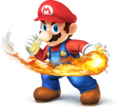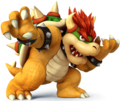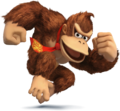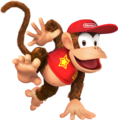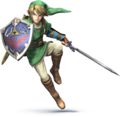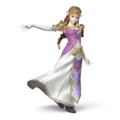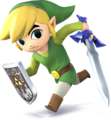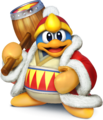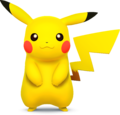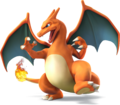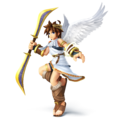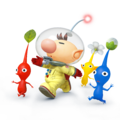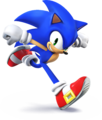Super Smash Bros. for Nintendo 3DS / Wii U
This article is about an upcoming game. Editors must cite sources for all contributions to this article. Edits that do not follow this standard may be reverted without notice.
Do not upload any leaked images or media files before this game is released. Per our policy, any such files will be immediately deleted.
Super Smash Bros. for Nintendo 3DS and Super Smash Bros. for Wii U are both versions of the upcoming fourth installment of the Super Smash Bros. series being developed by Sora Ltd. and Namco Bandai Games.[1] Each version has a different release date due to the time that it will take to finish each one.[2] The Nintendo 3DS version will come first, with the Wii U version set to be released later in 2014.
Gameplay
Super Smash Bros. for Nintendo 3DS / Wii U has some similarities and differences from Super Smash Bros. Brawl, as well as differences between the two versions. Final Smashes and Footstool Jumping features make a return, while the "tripping" mechanic has been removed[3]. The games' Adventure Mode will also be significantly different than The Subspace Emissary.[4] The pace of battles has also been stated to be in between Super Smash Bros. Melee and Super Smash Bros. Brawl.
Both games will share the same roster, but the movesets and animations of returning characters will go through a larger amount of change than the returning characters did from the transition of Melee to Brawl, with many returning characters being shown with completely new moves, and some appear to be getting significantly altered (such as Bowser). Returning characters are also getting a significant amount of buffing, including higher tier characters like Lucario. Aesthetic wise, the games are much more stylized and visually intense than previous entries, with the overall colors being bolder and brighter and many elements having been redone to stand out more.
Customization
It has also been stated that players will be able to send customized fighters from one version to the other.[5] Players can customize fighter's special attacks with one of three variations for each; the Mii Fighters and Palutena, however, have different attack types rather than customizable moves, and customizable moves cannot be used in With Anyone online. Players can also equip items to fighters to increase specific attributes (attack, defense, or speed) while sacrificing others. Up to three items can be equipped at a time.[6]; It has been confirmed that there will be other elements that connect the two versions of the game, though said elements have not been revealed.[7]
Nintendo 3DS version
For the Nintendo 3DS version, which is the first Super Smash Bros. game on a handheld, the fighters are given outlines during matches so as to be seen easier on-screen. The size of these outlines can be adjusted, as well as be completely removed. When playing a team match, the color of the characters' outlines match that of their team[8]. This version will feature stages with a bigger focus on handheld games, and is planned to run at 60 frames per second even when using the stereoscopic 3D; the Assist Trophy and Pokemon characters, however, have been stated to run at 30.[7] The bottom screen displays the character's icons and damage percentages, and tapping one of the icons highlights that character.[9]
Smash Run
A new mode, Smash Run, has been confirmed to be a Nintendo 3DS-exclusive mode, strongly resembling the City Trial mode from Kirby Air Ride while including elements of the Subspace Emissary mode from Super Smash Bros. Brawl. In this mode, players travel in a large maze-like map, fighting enemies from both Nintendo games and from Super Smash Bros. games, such as Magikoopas, Chandelures, Goombas, Shy Guys, and Kremlings. While fighting, players can collect several items similar to patches. These patches can increase attack power, special attack power, jumping, or movement speed. After five minutes, players are shown the stats of their attacks, courtesy of the patches they collected, and they are pitted in several modes, similar to the Stadiums from City Trial. The players then must fulfill certain conditions to win the game.[7]
Wii U version
The Wii U version has been confirmed to not make use of the GamePad's touch screen during gameplay. This version has also been announced to be compatible with the upcoming amiibo NFC figurines. Using these figures allows players to have the figure's character appear in the game and fight, either with or against the player or against each other.[10] Every time an amiibo competes in battle they increase their level and battle stats[11], the highest level being fifty[12]. Their moves are also customizable.[11]
Online Play
Both versions of the game are to feature online play similar to Super Smash Bros. Brawl in that players from all over the world can face others in matches. When playing with friends, players can customize the rules to their liking. When not playing with friends, two basic modes are available for play: For Fun and For Glory. In For Fun mode, players can battle on any of the stages except Final Destination with any rules, the stages being picked at random; only victories are recorded in this mode. In For Glory mode, players can only play on the "Final Destination" versions of stages, without items. One-on-one matches are possible in this mode, and both victories and losses are recorded.
In addition, rather than have an online leaderboard, the games will make use of a different type of ranking system, called "Global Smash Power." When playing in single player, the player's score determines their Global Smash Power, which is used to determine how strong the player is compared to others around the world.
Playable characters
Due to limitations with the Nintendo 3DS version of the game, certain characters from the previous installments in the series might be cut from the rosters of both versions in order to keep them consistent.[2] So far, 33 characters have been confirmed, consisting of 24 veterans and 9 newcomers. Unlike previous games in the series, with the removal of in-game transformation, Sheik, Zero Suit Samus, and Charizard are now standalone characters.
Returning
Newcomers
| Characters | |||||||||||||||
|---|---|---|---|---|---|---|---|---|---|---|---|---|---|---|---|
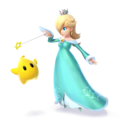 Rosalina & Luma[29] Rosalina & Luma[29] |
 Greninja[30] Greninja[30] |
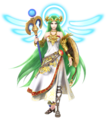 Palutena[31] Palutena[31] | |||||||||||||
 Mii Fighter Mii Fighter |
 Villager[32] Villager[32] |
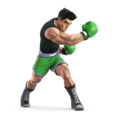 Little Mac[33] Little Mac[33] | |||||||||||||
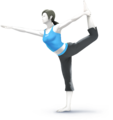 Wii Fit Trainer[34] Wii Fit Trainer[34] |
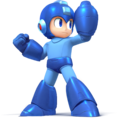 Mega Man[35] Mega Man[35] |
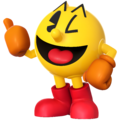 Pac-Man[36] Pac-Man[36] | |||||||||||||
Other characters
Character movesets
- F.L.U.D.D. (Mario attack)
- Toad (Peach attack)
- Luma (Rosalina attack)
- Pikmin (Olimar attack)
- Rush (Mega Man attack)
- Lloid (Villager attack)
- Tom Nook (Villager's Final Smash)
- Timmy and Tommy Nook (Villager's Final Smash)
- Navi (Link taunt)
- Phantom (Zelda attack)
- Gordo (King Dedede attack)
- Mega Man X (Mega Man's Final Smash)
- Mega Man Volnutt (Mega Man's Final Smash)
- MegaMan.EXE (Mega Man's Final Smash)
- Star Force Mega Man/Geo Stellar (Mega Man's Final Smash)
- Blinky, Pinky, Inky, and/or Clyde (Pac-Man attack)
- Galaga (Pac-Man attack)
- Mappy (Pac-Man attack)
- Pooka (Pac-Man attack)
Stage cameos
|
|
|
Stage bosses
- Yellow Devil (Wily Castle)
Smash Run enemies
Mario series
- Banzai Bill
- Bill Blaster[39]
- Bullet Bill
- Flame Chomp[40]
- Goomba
- Grand Goomba
- Hammer Bro.
- Koopa Paratroopa
- Koopa Troopa
- Lakitu[40]
- Magikoopa
- Spike Top[41]
Donkey Kong series
The Legend of Zelda series
Metroid series
Yoshi series
Kirby series
Pokémon series
Ice Climber
Kid Icarus series
- Boom Stomper
- Bumpety Bomb[42]
- Daphne[42]
- Orne[44]
- Mimicutie
- Monoeye
- Reaper
- Skuttler
- Clubberskull[39]
- Megonta[42]
- Flage[39]
Pikmin series
Rhythm Heaven series
Find Mii
Sonic the Hedgehog series
Mega Man series
Pac-Man series
Super Smash Bros. series
Stages
According to Masahiro Sakurai, both versions of the game will feature different stages. The Wii U version will mostly feature stages based on games released on home consoles, while the 3DS version will mostly feature stages based on games released on handheld systems.[3] In the Nintendo 3DS version, each stage has only two tracks that can play, whereas the Wii U version will have a comprehensive list similar to My Music from Super Smash Bros. Brawl. Additionally, most of the stages in both versions feature a "Final Destination" variation in addition to the normal one, being a flat course with no obstacles or other platforms.
Nintendo 3DS
| Stages | |||||||||||
|---|---|---|---|---|---|---|---|---|---|---|---|
 Battlefield[7] |
File:SSB3DS Final Destination.png Final Destination[45] |
 Gerudo Valley[7] (from The Legend of Zelda: Ocarina of Time 3D) | |||||||||
 Spirit Train[7] (from The Legend of Zelda: Spirit Tracks) |
 Arena Ferox[7] (from Fire Emblem: Awakening) |
 3D Land[7] (from Super Mario 3D Land) | |||||||||
 Living Room[7] (from Nintendogs + Cats[46]) |
 Reset Bomb Forest[7] (from Kid Icarus: Uprising) |
File:SSB4 3DS Dark Emperor.jpg Find Mii[7] (from StreetPass Mii Plaza) | |||||||||
 Rainbow Road[7] (from Mario Kart 7) |
 Boxing Ring[7] (from Punch-Out!!) |
 Tortimer Island[7] (from Animal Crossing: New Leaf) | |||||||||
 Prism Tower[7] (from Pokémon X and Pokémon Y) |
 A stage based on Tomodachi Life. |
 Balloon Fight[7] (from Balloon Fight) | |||||||||
 Jungle Japes (Super Smash Bros. Melee stage)[7] |
 Golden Plains[47] (from New Super Mario Bros. 2) |
File:SSB4 3DS PacMan Stage.jpg A stage based on Pac-Man. | |||||||||
Wii U
Items
So far, 72 items (23 new and 49 returning), 23 Assist Trophies (12 new and 11 returning), and 24 Pokémon (14 new and 10 returning) have been confirmed.
New items
Returning items
